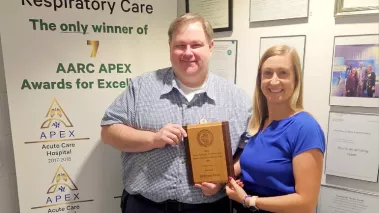The National Institute on Drug Abuse recently awarded Rush University System for Health a $2 million grant to establish the Great Lakes Node of the NIDA Clinical Trials Network. The node is one of 18 research centers established nationwide to improve the delivery of scientifically based treatments to substance misuse patients, and to link treatment providers and patients across country.
Under the leadership of co-principal investigators Niranjan S. Karnik, MD, PhD, The Cynthia Oudejans Harris, MD, Professor of Psychiatry, and Mark H. Pollack, MD, the chairperson of the Rush Department of Psychiatry, the Great Lakes Node will develop and test interventions for substance misuse through the implementation of cutting-edge clinical trials. Through partnerships with experienced investigators representing major academic medical centers in the greater Chicago and Wisconsin areas, the node will serve as a vital Midwestern hub for the Clinical Trials Network.
Rush will serve as the lead institution that brings together the University of Illinois at Chicago, University of Chicago, Loyola University Medical Center, Lurie Children’s Hospital of Chicago, Northwestern Memorial Hospital, and UW Health and Medical College of Wisconsin as members of this group.
In addition to expanding the success of the Clinical Trials Network approach, the node will bring substantial experience in the following research areas:
- Adolescents/young adults
- Seniors/aging
- Digital & mobile technologies
- Opioid misuse
- Collaborative care/population health
- Telehealth
- Electronic health records
“This grant opens the door to having Chicago and the greater Midwest region participate in some of the country’s most important research trials to address opioid and substance misuse,” Karnik said. “It will allow us to bring the best treatments to patients in the region, and help facilitate better care for patients who are looking for ways to reduce the use of substances, and thereby improve their health and the quality of their lives.”
The Great Lakes Node will continue Rush’s pledge to deploy and support evidence-based interventions to treat individuals facing substance misuse. The Rush system is developing new models of care to track outcomes and examine the impact on the lives of patients.
Additional support has been received from the National Institutes of Health, Substance Abuse and Mental Health Services Administration, Illinois Department of Human Services, and other government agencies to address the substance misuse crises and to provide training and education opportunities for colleagues.
“Research leaders at the national level are hoping that our researchers can bring the expertise in digital health, treatments for adolescents and older populations, and systems-based interventions to the national level and help other hospitals and care systems improve the quality of care that they provide,” Karnik said.







